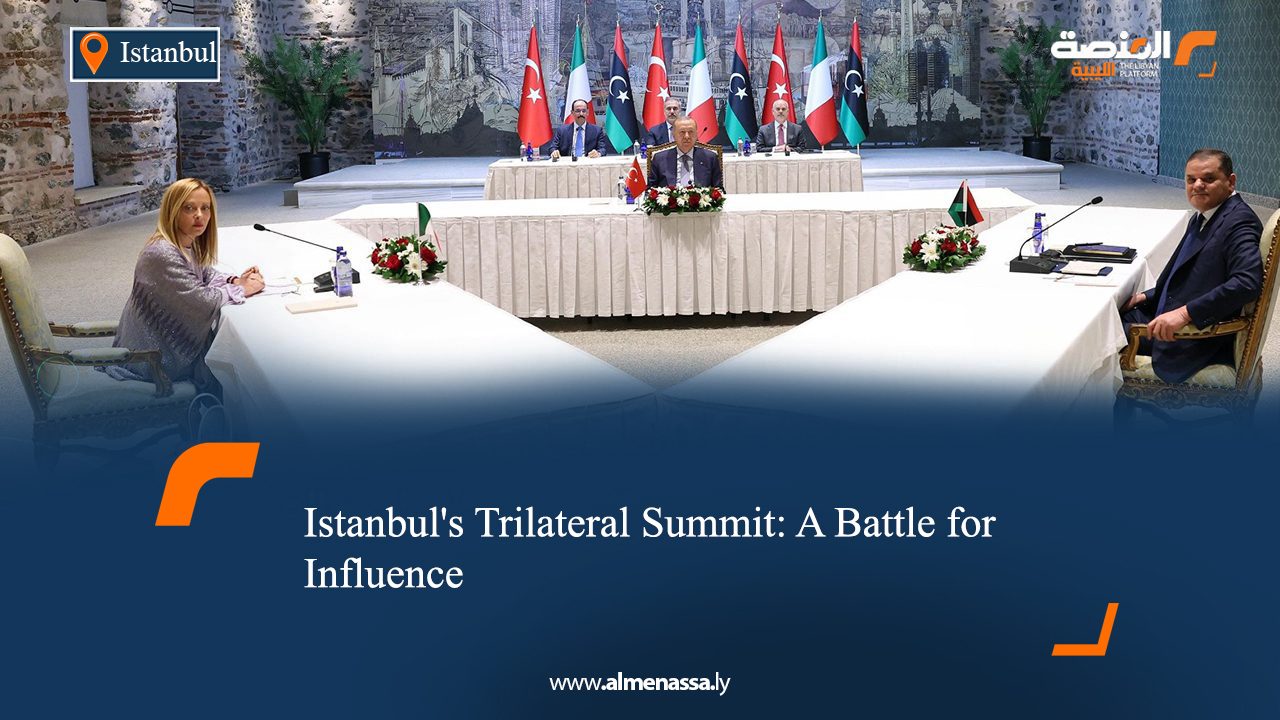A trilateral summit was recently held in Istanbul, bringing together Turkish President Recep Tayyip Erdoğan, Libyan Prime Minister Abdul Hamid Dabaiba of the Government of National Unity (GNU), and Italian Prime Minister Giorgia Meloni.
According to the “Hukumatuna” platform, the summit focused on economic cooperation between the three nations. Key areas of discussion included boosting partnerships in energy, oil and gas, and infrastructure. The leaders emphasized the importance of connecting Libya to regional projects in the Mediterranean, investing in ports, developing electrical grids, and supporting joint strategic projects for mutual growth and new opportunities.
Turkish-Italian Arrangements for Influence
However, the newspaper Al-Arab reported a different story, suggesting that the summit’s true agenda was to arrange a “Turkish-Italian” agreement on influence in western Libya and to manage their disagreements. The newspaper claimed that Dabaiba’s presence was merely symbolic, serving as a witness to the arrangements between Erdoğan and Meloni rather than an equal partner in the discussions.
Al-Arab stated that issues like migration and a political solution for Libya were secondary to the economic and security matters discussed. The paper added that the core of the Turkish-Italian competition lies in reconstruction and oil and gas projects, which necessitated a mutual understanding to prevent tensions.
The report also highlighted that Dabaiba consistently seeks to appease Turkey, despite doubts about Ankara’s willingness to protect his government. Meanwhile, Italy is working hard to maintain its historic influence in its former colony, frequently intervening under various pretexts, most notably migration, to secure its companies’ interests. The newspaper concluded that both Italy and Turkey are aligning with the United States’ goal of expanding its security and defense influence in North Africa to counter growing Russian influence in southern and eastern Libya and the Sahel region.
What Was the Real Agenda?
Abdul Hafiz Ghoga, the former Vice President of the Transitional Council, insisted that the Libyan people have a right to know the summit’s true agenda and its outcomes. He was skeptical of any pre-existing coordination between Turkey and Italy regarding the Libyan file. He pointed out that Libyans are often left in the dark about agreements their government signs, citing the controversial 2019 maritime border agreement between Turkey and the Government of National Accord as a precedent.
Ahmed al-Mahdawi, a political analyst, suggested the summit was aimed at de-escalating the tense situation in Tripoli. He urged Dabaiba to remain calm until the UN envoy presents a new political roadmap on August 15. Al-Mahdawi believes Italy represents the European Union at the summit and is seeking a solution to the ongoing dispute with Turkey and Libya over the maritime border agreement. He views the summit as a tool to pressure Libyan factions to facilitate the UN envoy’s mission, arguing that Erdoğan has no roadmap separate from the UN’s plan.
According to al-Mahdawi, Dabaiba is trying to use the summit as a bargaining chip before the roadmap is launched. He claims Dabaiba is provoking militias under the guise of fighting organized crime to create a pretext for a battle to eliminate his rivals and cement his control over the capital ahead of the new political process.
The Libyan-Greek-Turkish conflict
Firas Oglu, a Turkish political analyst, framed the summit as a strategic event within the context of the Libyan-Greek-Turkish conflict over maritime borders. He sees the summit as a way to pressure Athens into a political agreement with Turkey, which seems unlikely at the moment. He believes the summit was a way for Ankara and Tripoli to coordinate their positions against Greece and its European Union supporters concerning energy exploration south of Crete. Oglu affirmed that Turkey continues to politically support the GNU, despite recent rapprochement with other Libyan factions.
A Shift in Ankara’s Stance?
In contrast, political analyst Muhammad Mahfouz downplayed the significance of Dabaiba’s visit, asserting that Ankara has shifted its position on the Libyan crisis. He noted a major diplomatic opening from Turkey, indicating that Ankara is no longer against the idea of a government change. Mahfouz cited Turkey’s openness to solutions proposed by the UN mission’s Advisory Committee and pointed to Turkey’s stopping of military strikes that Dabaiba had planned for May as evidence of this shift.
Mahfouz believes Turkey no longer finds it acceptable for the GNU to hold sole control over Tripoli. He argues that Dabaiba has no leverage when the international community agrees on a government change, stressing that his legitimacy, like that of other political bodies in Libya, is derived from international agreements.
The true outcomes of the Istanbul summit remain unclear to many, especially since it was held behind closed doors between parties each seeking to protect their interests, with the Prime Minister of the GNU in attendance.


